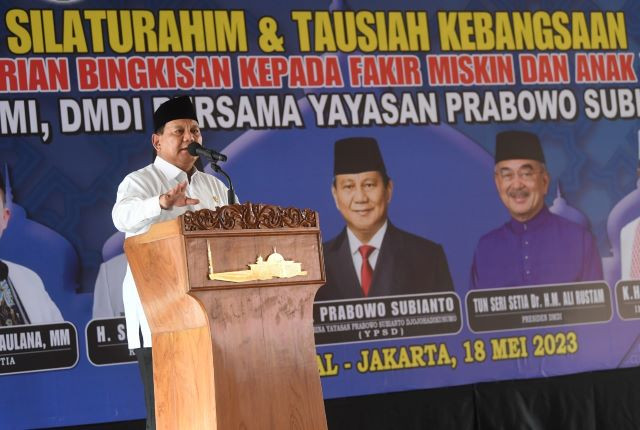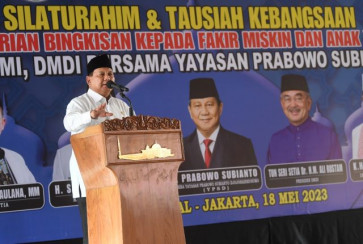Popular Reads
Top Results
Can't find what you're looking for?
View all search resultsPopular Reads
Top Results
Can't find what you're looking for?
View all search resultsMosque politicization: Seizing votes from houses of worship
The politicization of mosques runs counter to the primary functions of a mosque as a place of worship and spiritual and social development.
Change text size
Gift Premium Articles
to Anyone
 Youth at heart: Defense Minister Prabowo Subianto speaks in a gathering organized by the Indonesian Mosque Youth Communication Forum at Istiqlal Mosque in Jakarta on May 18, 2023. Prabowo, who is also Gerindra Party chairman, is bidding to contest the presidential election in February 2024.
(Antara/Akbar Nugroho Gumay)
Youth at heart: Defense Minister Prabowo Subianto speaks in a gathering organized by the Indonesian Mosque Youth Communication Forum at Istiqlal Mosque in Jakarta on May 18, 2023. Prabowo, who is also Gerindra Party chairman, is bidding to contest the presidential election in February 2024.
(Antara/Akbar Nugroho Gumay)

In the last few months, all presumptive presidential candidates have visited mosques allegedly for political purposes. In March, former Jakarta governor Anies Baswedan visited Al-Akbar Grand Mosque in Surabaya, East Java, while Central Java Governor Ganjar Pranowo toured Banten Grand Mosque in West Java in May.
Gerindra Party chairman Prabowo Subianto attended a youth gathering at Istiqlal Mosque in Jakarta last month as a speaker. He refrained from displaying his political ambitions despite temptations from the floor to do so.
The Election Supervisory Body (Bawaslu) has expressed concerns about the potential misuse of places of worship, including mosques, for political activities and reminded all political parties and candidates not to break the rule.
Law No 7/2017 on elections prohibits the use of houses of worship for campaigning and other political purposes. Recently, Religious Affairs Minister Yaqut Cholil Qoumas stated publicly to protect mosques from any politicization agenda.
However, Prosperous Justice Party (PKS) politician Mardani Ali Sera insists that there is nothing wrong with mosque politicization. In fact, in every election, gaining control of houses of worship, especially mosques, and religious figures has been crucial in winning voters’ hearts and minds.
All candidates will fight it out for support from Muslim voters in this majority-Muslim country. They are approaching and seeking a blessing from prominent and charismatic religious figures such as ustads, kyai (religious teachers), habaib (prophet descendent) by visiting their Islamic boarding schools and mosques.

It is widely known that the politicization of mosques is common during elections. It refers to the practice of using mosques as a means to promote certain political agendas. It obviously runs counter to the primary functions of a mosque as a place of worship and spiritual and social development. Furthermore, this practice can lead to polarization, a hostile atmosphere and horizontal conflict within the community.

















